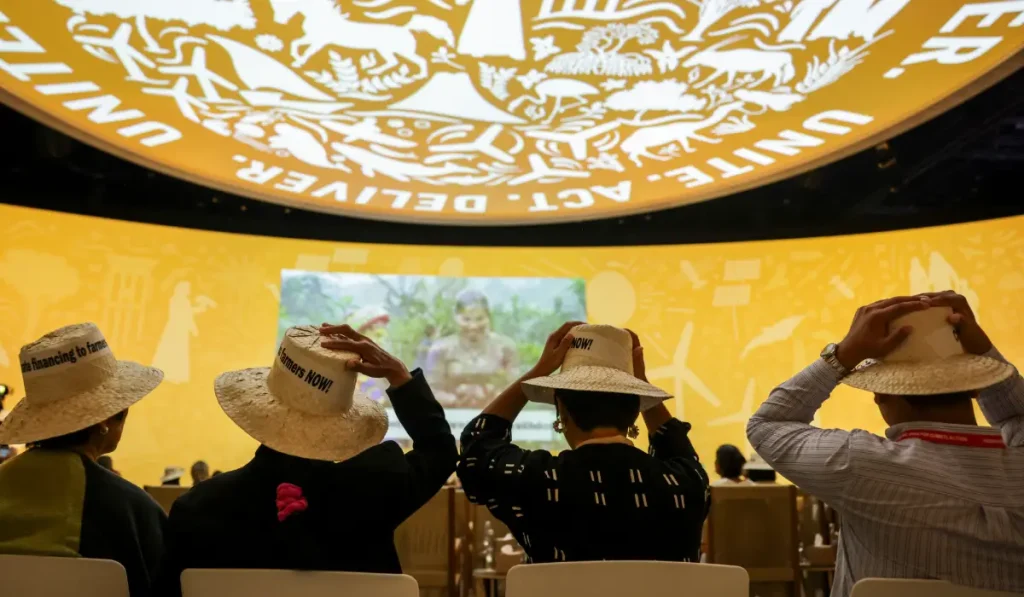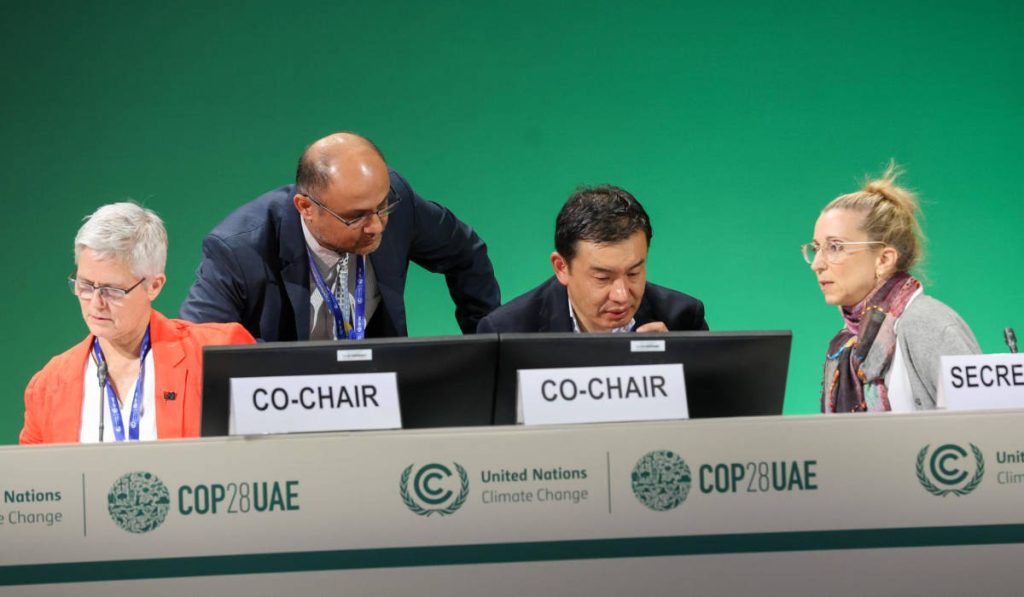The dispute over and related failure to timeously settle an Agenda for Bonn set the tone for a difficult series of climate negotiations in Bonn between 5 and 15 June 2023. The Bonn intersessionals, also known as SB58, are important as a litmus test of the issues likely to come up in the multilateral negotiations that follow this year, notably COP28 in Dubai. It is a “halftime” of sorts, which was already overshadowed by the war in Ukraine and concerns on the impartiality of COP28 President-Designate Sultan Al Jaber.
Before proceedings could formally commence Parties had to agree to an agenda. However, it took some time to even reach agreement on this. Developed countries wanted to include the Sharm el-Sheikh Mitigation Ambition and Implementation Work Programme (MWP) in the agenda. The purpose of the MWP is to scale up mitigation ambition this decade. It is viewed with some suspicion by developing countries who are concerned it will be used to surreptitiously to impose new targets, contrary to the nationally determined approach to targets envisaged by the Paris Agreement. The contentious issue of fossil fuel phase outs has also arisen under this programme. On the other hand, developing countries (G77 plus China) wanted to add national adaptation plans to the agenda. Without being able to reach agreement on either of these items, proceedings commenced based on the provisional agenda, to allow for further consultation. Shortly thereafter, Bolivia on behalf of the group known as the Like Minded Developing Countries (LMDCs) asked to include the scaling up of climate finance on the agenda. Climate finance has always been, and remains one of the most contentious issues between the global north and south. This lead to deadlock with some groups arguing that they could not accept the one without the other, all arguing that they wanted these issues to have a “dedicated” space or working track instead of being incorporated into other issues.
The agenda was adopted on the final day with neither the MWP or financial support being added, with an informal note on these issues to be circulated instead. As we commented in African Arguments, while the agenda is an important means to ensure that items are meaningfully on the table, holding negotiations hostage until an item appears on them runs the risk of agenda setting being used as the platform for substantive debates before allowing any formal discussion at all. This was effective with loss and damage at COP27, but it runs the risk of holding negotiations to ransom before they can even begin.
Notwithstanding that they were operating on a provisional agenda, parties were able to engage on multiple issues during the negotiations. We’ve highlighted what we think some of the key discussion points and outcomes are:
Finance: While, scaling climate finance did not formally make it onto the agenda, it nevertheless continued to permeate negotiations. Discussions continued to focus on Article 2(1)(c) which some interpret as requiring all (both public and private) finance flows as needing to be consistent with the Paris Agreement. Developed countries have been focusing on this element, seeking to draw in, make more efficient and catalyse other forms of climate finance from other sources. In contrast, developing countries have been focusing on Article 9, which sets out the obligations of developed countries to provide climate finance. There is a concern by them that Article (2)(1)(c) is being used as a platform to broaden the donor base (eg including China and Gulf States), and make developing countries rely on private sector investment and loans to fund climate responses.
These discussions permeated negotiations on the Global Stocktake (discussed below), and how the final decision under the Stocktake is to be structured. Developed countries want to see broad language around “finance flows” and developing countries want to see Paris Agreement Article 9 language on “means of implementation”.
A Technical Expert Dialogue on the new climate finance target also was underway at Bonn. This target will replace the current $100 billion target of climate finance to be provided by developed countries in 2025. David Chama Kaluba, a climate finance negotiator for the African Group from Zambia, told Carbon Brief following the first meeting on this subject that there had been “substantial progress”, adding that “I think we are now answering the real questions”. He stated however, that “there are no numbers being discussed yet…We don’t want to come up with a number abruptly, which is not informed by any technical aspects.”
Global Stocktake: Another focus area of the talks was the Global Stocktake. This is a process that assesses the collective progress in achieving the goals of the Paris Agreement and is due to conclude at COP28. A draft framework was published for the Stocktake during the Bonn Talks setting out the key focus areas. As outlined above, how climate finance was framed in this outline proved to be contentious, understandably so because what we call it now, has implications for how the parties agree the issues are and what should be summarised in terms of progress. Ultimately in summarising progress to date parties are being led down a path of debate about what the big issues are and who is to blame. For instance, developing countries wanted to see an assessment of pre-2020 gaps in implementation and equity in the global stocktake. This relates to arguments from developing countries about their share to the available carbon space going forward, and the equity of sharing it. Australia, whilst acknowledging the need to take the lead on emissions reductions, argued that their development took place during a time when there were little alternatives and little knowledge of impacts. The US said the approach by developing countries was “unacceptable”. These are historic debates taking place under the guise of devising a summary document on progress.
Loss and Damage: In relation to Loss and Damage, things were more positive. While there is little time to finalise arrangements before the end of this year, at least for the first time, countries are now meaningfully discussing the detail of who will provide finance, where will the fund sit, and who benefits. Although parties still seem split along familiar lines, we have not previously ever gotten to this level of detail in negotiations. Developing countries could, however, not agree on which host organisation to locate the Santiago Network on loss and damage (either the Nairobi UN Office for Disaster Risk Reduction or the Caribbean Development bank in Barbados). The Network is supposed to help developing countries access technical support but has long languished as just a website. The issue will be revisited again at COP28.
Adaptation: On adaptation, countries discussed national adaptation plans, the global goal on adaptation (GGA), the Adaptation Committee, and the Nairobi work programme. The most interesting discussions to follow were those on the GGA. At Bonn, the G77 and China were looking to see targets included within the framework of the GGA, with output orientated indicators, instead of outcome orientated ones. Negotiations ended with a series of options of draft conclusions. According to Carbon Brief, the first is option is more substantive with an annex that provided elements for the development of the framework (preferred by the Global South), and the second provided a great level of flexibility, were more popular with the Global North, with a stronger focus on procedural conclusions. Ultimately, the third option, which provided a focus on the structure of the GGA, was adopted.
Just Transitions: On Just Transitions, at COP27 last year, parties adopted a “work programme on just transition pathways”. At Bonn, countries were tasked with fleshing out what this programme would entail and its outputs. Similar tensions that dominated other work streams, infiltrated these negotiations, with developing countries wanting to focus on finance, harbouring concerns that the talks were mitigation centric, and disputes about whether to expressly mention the principle of common but differentiated responsibilities. Developed countries wanted it to focus mostly on the workforce and energy transition. Others interpreted the programme more as a knowledge exchange about what different countries are doing nationally to achieve their own just transitions. African countries wanted the scope of the just transition to be determined by each individual country, and that parties should discuss how to support that process, and financial support. There was also disagreement about the role of the private sector in Just Transitions and “making all financial flows” consistent with the Paris Agreement (see previous discussion about Article 2(1)(c) above), with developed countries wanting to see measures to create “fiscal space and structural transformation”, whilst developing countries were concerned that this would create new conditions for support. The outcome was an informal note that captured the differing views and agreement of a further workshop at COP28.
Trade: Trade also came up during the “forum on the impacts of the implementation of response measures”, which falls under the mitigation workstream and assesses the effects, including cross border impacts, of domestic mitigation policies. In the closing plenary, the LMDC group lamented that despite proposals by developed countries to introduce unilateral CBAMs in the name of climate change responses, developed countries are ostensibly unwilling to have real discussions on these measures under the “Response Measures” agenda item. Bolivia stated “What kind of hypocrisy is this?”, adding that “such measures violate international trade rules, as well as the principles of equity and the UNFCCC provisions, particularly Article 3(5) of the Convention.”
Carbon Markets: Discussions around carbon markets and Article 6 remained in a “deeply technical phase”, although when have carbon market discussions not been deeply technical? Conclusions were mostly procedural, with discussions also focusing on older issues such as the transparency of trades, and whether countries can recall credits once sold. Another issue still being negotiated is credits for carbon removals (such as activities which remove carbon from the air), with concerns remaining about their lack of permanence. The Philippines is also championing credits for “emissions avoidance”, namely payments for not doing an activity, although parties are concerned that this would create challenges in allowing credits for hypothetical scenarios. Countries also agreed at Bonn to create a manual to guide countries on how to trade credits between themselves under Article 6.2, something that will go a long way in guiding parties on how to deal with this novel form of transacting credits between countries.
Where to from here: parties (or at these those that deigned to make it) then went into the Summit for a New Global Financing Pact in Paris. See our related article on this in this week’s issue. Things then go relatively quiet from a negotiation perspective until September, with African Climate Week, the G20 summit, New York Climate Week and the UN General Assembly.





